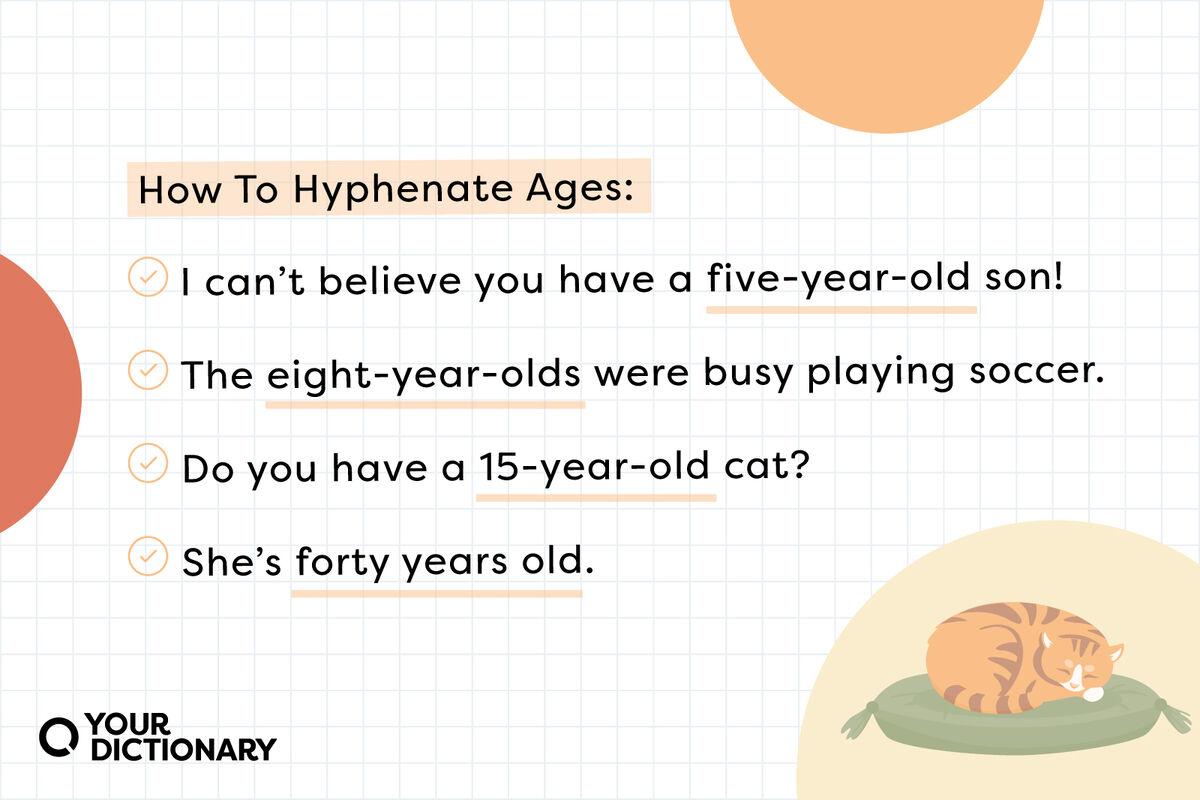
“You’re ten years old now!” you write in your nephew’s birthday card. Then you frown and change it to “You’re ten-years-old now!” But that doesn’t look quite right, either. The truth is, you do hyphenate ages when they’re written out — sometimes. It depends where they fall in the sentence. (Spoiler alert: You’re going to need another try on that birthday card.)
When Do You Hyphenate Ages?
It’s not as confusing as it seems. Ages that are written out are compound adjectives — multiple words that modify one noun. Just like fire-breathing modifies the noun dragon and bottle-juggling modifies the noun clown, ten-year-old modifies the noun nephew.
So that’s the answer — hyphenate everything? Not quite.
Use Hyphens Before the Noun
Compound adjectives are typically hyphenated when they come before a noun. That’s the case with written-out ages, as well.
- The fourteen-year-old girl loves to ride her bike.
- This thirty-year-old whiskey is very strong.
- We own a one-year-old dog and a fifty-year-old parrot.
- I can’t believe you have a five-year-old son!
Note that if you change the word year, as in five-month-old son or fourteen-week-old girl, the rule still applies.
Use Hyphens When the Age Is a Noun
The other time to use a hyphen for ages is when the age functions as a compound noun, without any other noun to modify. (This use only works with people.)
- You have to childproof your house when you have a two-year-old.
- After spending all day with sixteen-year-olds, I need a little quiet.
- The eight-year-olds were busy playing soccer.
- Have you ever babysat for a three-year-old?
Don’t Use Hyphens After the Noun
Now for the tricky part: You don’t use a hyphen if the age comes after the noun in a sentence. (Wait, that wasn’t too tricky.)
Also, change year to years if you’re describing an age higher than one year old.
- She’s forty years old.
- Is your sister twelve years old?
- I’m turning seventeen years old on my next birthday.
- Be careful with this necklace; it’s eighty years old.
If you can replace the whole age (She’s forty years old) with just the number of years (She’s forty), there’s no hyphen required.
Why Do You Need Hyphens?
Using a hyphen in a compound adjective or noun is a helpful way to clarify your meaning. Leaving the hyphen out can lead to confusing (though humorous) sentences.
- Four ten year old boys rode their skateboards. (Four ten looks like a misspelling of fourteen.)
- There are twenty seven year olds in this house. (Are there twenty seven-year-olds, or twenty-seven year olds?)
- I never thought I’d have two two year olds. (Two and two in a row is confusing.)
Do You Still Hyphenate if the Age Isn’t Written Out?
You’ve got the written ages down. Now, what about the numerical ages? Good news: The rule is exactly the same. Hyphenate when it comes before the noun or replaces the noun; don’t hyphenate when it comes after the noun.
- Where’s the 29-year-old birthday girl?
- The birthday girl is 29 years old.
- Do you have a 15-year-old cat?
- Is your cat really 15 years old?
Deciding whether you should write out a number depends on the style guide you’re using. However, because compound numbers (such as thirty-seven or ninety-two) are already hyphenated, you may choose to use their numerical forms instead — and you never want to write out numbers higher than 99.
Memory Tip: Look at the “Years”
Remember when we told you to change year to years if the compound adjective came after the noun? That’s about to come in handy.
If you’re describing someone’s age and using years old, stop — don’t use a hyphen. Years old only describes someone’s age after the noun (you’d never say “the thirteen-years-old cat”).
If the age includes year old (“the thirteen-year-old cat”), go crazy with the hyphens. The only exception is when something is one year old — anything higher gets a hyphen.